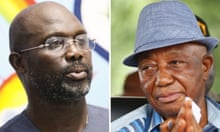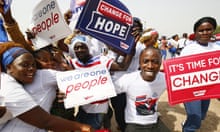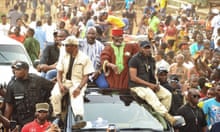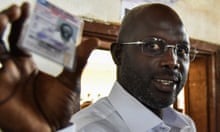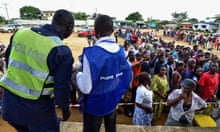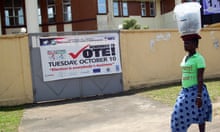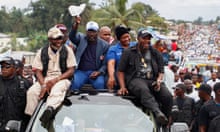Liberians have voted in large numbers in the first election run entirely by the country’s institutions and security forces since the civil war.
Police officers and election officials who had been preparing for months took their places at polling stations, listening sympathetically to complaints about impatient voters pushing in the queue and missing names on the rolls.
Though there were reports of ballots not arriving at stations until mid-afternoon, and of a politician being arrested after handing out money, such incidents appeared to be fairly isolated.
A video of police dealing with “election violence” which circulated on Facebook turned out to be just a drill.
“Everything is generally calm and going to plan. I can’t give you any numbers but I think voter turnout will be very high,” said the head of the national electoral commission, Jerome Korkoya.
The two elections in which Ellen Johnson Sirleaf, Africa’s first elected female leader, was voted president were managed in large part by the UN.
This time, Liberian police commissioner Gregory Coleman said: “We are in the driver’s seat and the UN’s in the back watching.“Our intervention as a police force comes as a cultural shock to people used over the years to seeing the police as a weapon of the government – and not as a tool of the state – to be used against them.”
The police had a reputation for extrajudicial killings and rape during the war. They still have a reputation for corruption – perhaps unsurprising given an ordinary patrol officer’s annual salary is $1,800 (£1,360), while a senator’s is $200,000.

“We’re trying to be that force that writes the history over, because there has never been a case where there’s been elections held in Liberia unilaterally handled by Liberian security where its integrity was not questioned,” Coleman said.
“We’ve gone through years of war, and the police have been restructured and reformed. We are prepared to do it this time and do it right – non-partisan, neutral and accessible to all.”
John Mahama, the former president of Ghana who led the regional election observation mission, said despite tension and fear among some voters who waited a long time to vote, the run-up to the election, voting and counting had gone well.
“The mission believes... Liberia is on track to achieve a credible poll thus far - I’m using my Kenyan experience - thus far.”
The chair of the National Elections Commission admitted however that there had been problems and said that they would try to “standardise the recruitment” of polling officers in future.
“Voters were confused. Sometimes they stood in line for an hour or two and were then told they were not in the right place. There was a lot of frustration,” said the chair, Jerome Korkoya.
Observers agreed. “I don’t think it was well-organised,” said Oscar Bloh of the Election Coordinating Committee, pointing out that while electoral officials worked through the night to collect and count votes, in many cases security personnel left, leaving them vulnerable.
Other problems included disorganised queues and ballot papers arriving late, he said. In one incident in Bong County, young people who, upon arriving at their polling station and seeing that their names were not on the list, set up a road block that caused long delays.
He said it was not clear whether these incidents would affect the outcome of the election. “We’re not sure yet of the scale of the problem,” he said.
Voters had jostled and sweated in a queue on Peace Island, a collection of tin-roofed houses perched on a bit of high land in the middle of a swamp in Monrovia.
Undeterred by the long wait in the sun, the women who made up most of the queue spoke of the need for better education, roads and healthcare as they waited.
Liberia’s lack of infrastructure before the war, and the devastation caused by the conflict, meant that the government’s promises to rapidly turn it into a middle-income country were too good to be true.
But that did not mean Liberians did not believe in them, and many feel disillusioned that the jobs, schools, electricity and roads that they thought were coming have not appeared.
More than anything, however, Peace Island’s residents spoke of the need to maintain stability.

Some of them fled their homes during the war and were living in camps before they came to the area in the mid-2000s. Others were demobilised soldiers who built small houses with their $540 payout, and so another name for the area is 540.
“When we came here, we said we wanted peace. That’s why it’s called Peace Island,” said Agnes Morris, who was one of the first people to move in, as she watched the queue of voters shuffle forward.
“Names have an effect. That’s why you don’t just call your child any name. You call them Blessing, Joy, Rejoice. You don’t call them Dog. Now, it’s peaceful here because of the name.”
Peace held for the day, but analysts say that if there is violence it is likely to happen before the run-off, which is almost guaranteed to take place as there are 20 candidates in the first round.
“We’ve worked hard to talk about peaceful elections before, during and after,” said Ruth Caesar, a member of the women’s peace movement and an election observer.
“We women are the keepers of the peace. It’s a badge we wear. When the war started in 1989, a lot of atrocities were committed, and women didn’t like that. We felt if we didn’t come and make peace among men, they would wipe all of us out.”
Under Morris’s definition, true peace has not been achieved.
“Peace is not just about fighting. It’s about whether you have clean water, electricity, if your kids can go to school. Then you have peace.”

